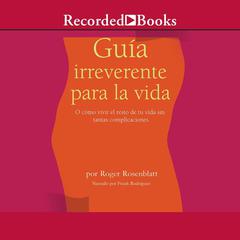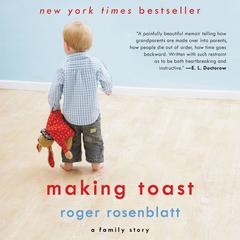 Play Audiobook Sample
Play Audiobook Sample
The Boy Detective: A New York Childhood Audiobook
 Play Audiobook Sample
Play Audiobook Sample
Quick Stats About this Audiobook
Total Audiobook Chapters:
Longest Chapter Length:
Shortest Chapter Length:
Average Chapter Length:
Audiobooks by this Author:
Publisher Description
The Washington Post hailed Roger Rosenblatt's Making Toast as "a textbook on what constitutes perfect writing," and People lauded Kayak Morning as "intimate, expansive and profoundly moving." Classic tales of love and grief, the New York Times bestselling memoirs are also original literary works that carve out new territory at the intersection of poetry and prose. Now comes The Boy Detective, a story of the author's childhood in New York City, suffused with the same mixture of acute observation and bracing humor, lyricism and wit.
Resisting the deadening silence of his family home in the elegant yet stiflingly safe neighborhood of Gramercy Park, nine-year-old Roger imagines himself a private eye in pursuit of criminals. With the dreamlike mystery of the city before him, he sets off alone, out into the streets of Manhattan, thrilling to a life of unsolved cases.
Six decades later, Rosenblatt finds himself again patrolling the territory of his youth: The writing class he teaches has just wrapped up, releasing him into the winter night and the very neighborhood in which he grew up. A grown man now, he investigates his own life and the life of the city as he walks, exploring the New York of the 1950s; the lives of the writers who walked these streets before him, such as Poe and Melville; the great detectives of fiction and the essence of detective work; and the monuments of his childhood, such as the New York Public Library, once the site of an immense reservoir that nourished the city with water before it nourished it with books, and the Empire State Building, which, in Rosenblatt's imagination, vibrates sympathetically with the oversize loneliness of King Kong: "If you must fall, fall from me."
As he walks, he is returned to himself, the boy detective on the case. Just as Rosenblatt invented a world for himself as a child, he creates one on this night—the writer a detective still, the chief suspect in the case of his own life, a case that discloses the shared mysteries of all our lives. A masterly evocation of the city and a meditation on memory as an act of faith, The Boy Detective treads the line between a novel and a poem, displaying a world at once dangerous and beautiful.
Download and start listening now!
“A memoir that proceeds by stealth and cunning,rewarding patient readers with some fine writing and provocative insights…[an] ellipticaland evocative mixture of memory and dream…Despite the subtitle, the text moreoften is autumnal in tone, written by the septuagenarian author and writingprofessor…Though the present and the past of his native Gramercy Park blur andblend, it really isn’t one of those New York memoirs; only in certain sectionsdoes it offer what the author terms ‘the poem of the city.’ The narrativehopscotches back and forth across decades and neighborhoods, daring readers ordetermine what the mystery might be…He shows a safecracker’s precision in hisreflections on death, truth, and how the writer deals with both.”
— Kirkus Reviews
Quotes
-
“The memoir is, at its heart, a valentine to the New York City of the ’50s and today and to the author’s favorite detective stories and films…No matter where you’re from, his story resonates.”
— People (4 stars) -
“The Boy Detective is filled with curves and knuckleballs and the occasional spitter. Hey, pal, have fun catching.”
— USA Today -
“That Roger Rosenblatt’s The Boy Detective has no table of contents will make perfect sense to readers who follow the meandering path that constitutes his charming memoir of growing up around Gramercy Park. Categorizing his musings would be too confining.”
— New York Times -
“The book is rich with recollections and with the lush wanderings of memory and imagination. In combination they draw the reader into one of the most entertaining, thoughtful and deeply moving minds among nonfiction writers today…[a] quiet, triumphant ambulation, a characteristically eloquent and multiply rewarding book.”
— Washington Post -
“To enter the world of this wonderful memoir is to leave the dull certainties of home and go wandering. The author’s destination is always the great wide world Out There, and through his sharp, compact prose, Roger Rosenblatt takes the reader with him. He is, after all, what some nineteenth-century Parisians called a flâneur, a stroller sauntering through anonymous crowds in the noisy, greedy, unscripted panoramas of the city…In this extended essay, at once a memoir and a meditation on the literary form itself, Rosenblatt writes the way a great jazz musician plays, moving from one emotion to another, playing some with a dose of irony, others with joy, and a few with pain and melancholy.”
— New York Times Book Review -
“Roger Rosenblatt’s evocative memoir…combines a walking tour around vanished Manhattan with a meditation, not only on the classic mystery fiction he loves but also on those larger metaphysical mysteries that defy even the shrewdest detective’s reasoning.”
— NPR -
“Readers who believe a journey is worth more than the destination will find a kindred spirit in Rosenblatt, who is generous company during his wanderings.”
— Christian Science Monitor -
“A hallmark of memoir is the self now reflecting on the self then. This book pulls off the high-wire feat of illuminating that double identity and giving readers the mental atmospheres of both narrators, the rascal back then and the reflective adult today…deliciously satisfying.”
— New York Journal of Books -
“Funny, intelligent, page-turning, this memoir doesn’t just describe a 1940s childhood in New York City; rather, it ruminates on the life of an artist born in and shaped by its streets.”
— Daily Beast -
“Memoir, urban travelogue, or summing up of a career grounded in the written word, Roger Rosenblatt’s The Boy Detective is an elegant and wise journey through an incomparable city and a meaning-filled life.”
— Shelf Awareness -
“Teaching a class on memoir writing, Rosenblatt is struck by his own powerful memories of a childhood in Manhattan with fantasies of being a boy detective, focused then on clues, now on significant moments…Rosenblatt shares poignant memories of the landscape of his childhood: the New York Public Library, Gramercy Park, Union Square, Madison Square Garden, and long-gone tenements and movie theaters. With the beautiful, lyrical writing and thoughtful reflection for which he is known, Rosenblatt offers beautifully rendered memories of childhood and ongoing curiosity about the city he so obviously loves.”
— Booklist -
“In the vein of his other recent works, Rosenblatt has taken memoir writing—a subject he teaches at State University of New York at Stony Brook—and turned it on its head once again. Walking the Manhattan streets of his childhood, Rosenblatt uses the city landscape to delve into eclectic ruminations on the nature of time and space, the slipperiness of reality and memory…mixing in history, literary references, geography, philosophy, and poetry…Rosenblatt’s writing is honest, yet it produces a magical world unto itself…But Rosenblatt isn’t out to uncover the meaning of life—he is celebrating the fact that ‘life calls for nothing but itself.’”
— Publishers Weekly
Awards
-
One of the New York Times Book Review 100 Notable Books of 2013
The Boy Detective Listener Reviews
Be the first to write a review about this audiobook!
About Roger Rosenblatt
Roger Rosenblatt’s essays for Time magazine and PBS have won two George Polk Awards, a Peabody, and an Emmy. He is the author of six Off-Broadway plays and thirteen books, including the national bestseller Rules for Aging and Children of War, which won the Robert F. Kennedy Book Prize and was a finalist for the National Book Critics Circle Award. He has written two satirical novels, Beet and Lapham Rising, also a national bestseller. In 2008 he was appointed a distinguished professor of English and writing at Stony Brook University.
About Robert Fass
Robert Fass is a veteran actor and twice winner of the prestigious Audie Award for best narration. He has earned multiple Earphones Awards and been named in AudioFile magazine’s list of the year’s best narrations for six years.

























